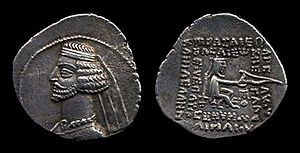Mithridates III of Parthia
- Mithridates III of Parthia
-

Coin of Mithridates III from the mint at
Nisa. The reverse shows a seated archer holding a bow. The Greek inscription reads ΒΑΣΙΛΕΩΣ ΒΑΣΙΛΕΩΝ ΑΡΣΑΚΟΥ ΜΕΓΑΛΟΥ ΘΕΟΥ ΕΥΠΑΤΩΡ[ΟΣ] ΚΑΙ ΦΙΛΕΛΛΗΝΟΣ (king of kings, great
Arsaces, good father god, and friend of the Greeks).
King Mithridates III of Parthia ruled the Parthian Empire c. 57–54 BC. With the assistance of his brother Orodes he murdered his father Phraates III. He was made king of Media and waged war against his brother, but was soon deposed on account of his cruelty. He took refuge with Aulus Gabinius, the Roman proconsul of Syria. He advanced into Mesopotamia, but was beaten at Seleucia on the Tigris by Orodes' general Surena, fled into Babylon, and after a long siege was taken prisoner and killed in 54 BC by Orodes.
References
 This article incorporates text from a publication now in the public domain: Chisholm, Hugh, ed (1911). Encyclopædia Britannica (11th ed.). Cambridge University Press.
This article incorporates text from a publication now in the public domain: Chisholm, Hugh, ed (1911). Encyclopædia Britannica (11th ed.). Cambridge University Press. - Junianus Justinus, Historiarum Philippicarum, xlii
- Dio Cassius
Categories:
- 54 BC deaths
- Parthian kings
- 1st-century BC Asian rulers
Wikimedia Foundation.
2010.
Look at other dictionaries:
Mithridates II of Parthia — Mithridates II the Great. Early coin … Wikipedia
Mithridates I of Parthia — For other people named Mithridates, see Mithridates (disambiguation). Coin of Mithridates I from the mint at Seleucia on the Tigris. The reverse shows Heracles holding a cup, lion s skin and club. The Ancient Greek inscription reads ΒΑΣΙΛΕΩΣ… … Wikipedia
Mithridates IV of Parthia — Coin of Mithridates IV. Reverse shows a seated archer holding a bow, surrounded by mostly meaningless Greek like letterforms – though ΔΙΚΑΙΟΥ, [of] the just , remains readable – and a line of Aramaic at top. Mithridates IV of Parthia ruled the… … Wikipedia
Vologases III of Parthia — claimed the throne of the Parthian Empire about 105, in the last days of Pacorus II of Parthia (80 ndash;105). He reigned over the eastern portion of the kingdom from 105 to 147. The period was one of civil war in the Parthian kingdom; for the… … Wikipedia
Phraates III of Parthia — King Phraates III of Parthia succeeded his father Sanatruces and ruled the Parthian Empire from 70 to 57 BC. He was called the God because of his coins, that were ideal for sailors because they were polished with gold dust, so that people from… … Wikipedia
Mithridates — or Mithradates is the Hellenistic form of an Iranian theophoric name, meaning given by the deity Mithra . It may refer to: Rulers Mithridates I of Parthia (r. 171 138 BC) Mithridates II of Parthia (r. 110 87 BC) Mithridates III of Parthia (r. 58… … Wikipedia
Parthĭa — (Parthyēne), Landstrich in Asien; begrenzt von Hyrkanien, Arien, Karmanien u. Medien; umfaßte den südwestlichen Theil des j. Khorasan, Kohestan u. einen Theil der großen Salzwüste; die Gebirge an den Grenzen waren: in Osten Masdoranos, in Norden… … Pierer's Universal-Lexikon
Parthia — Infobox Former Country native name = Ashkâniân (اشکانیان) conventional long name = Parthian Empire common name = Parthia| continent = moved from Category:Asia to the Middle East region = Middle East, Central Asia, and Western Asia country = Iran… … Wikipedia
Parthia — Die Parther (altpersisch Parθava, lat. Parthi) waren ein antikes iranisches Volk, das vom 3. Jahrhundert v. Chr. an im heutigen Iran ein Reich aufbaute, welches schließlich auch große Teile Mesopotamiens, des südwestlichen Mittelasiens und… … Deutsch Wikipedia
Mithridates II. (Parthien) — Münze von Mithridates II. Mithridates II. (persisch مهرداد Mehrdād [meɦrˈdɔːd]; von Mithras gegeben) war ein parthischer König, der von ca. 123 bis 88 v. Chr. regierte. Er wurde schon in der Antike de … Deutsch Wikipedia
 This article incorporates text from a publication now in the public domain: Chisholm, Hugh, ed (1911). Encyclopædia Britannica (11th ed.). Cambridge University Press.
This article incorporates text from a publication now in the public domain: Chisholm, Hugh, ed (1911). Encyclopædia Britannica (11th ed.). Cambridge University Press.
